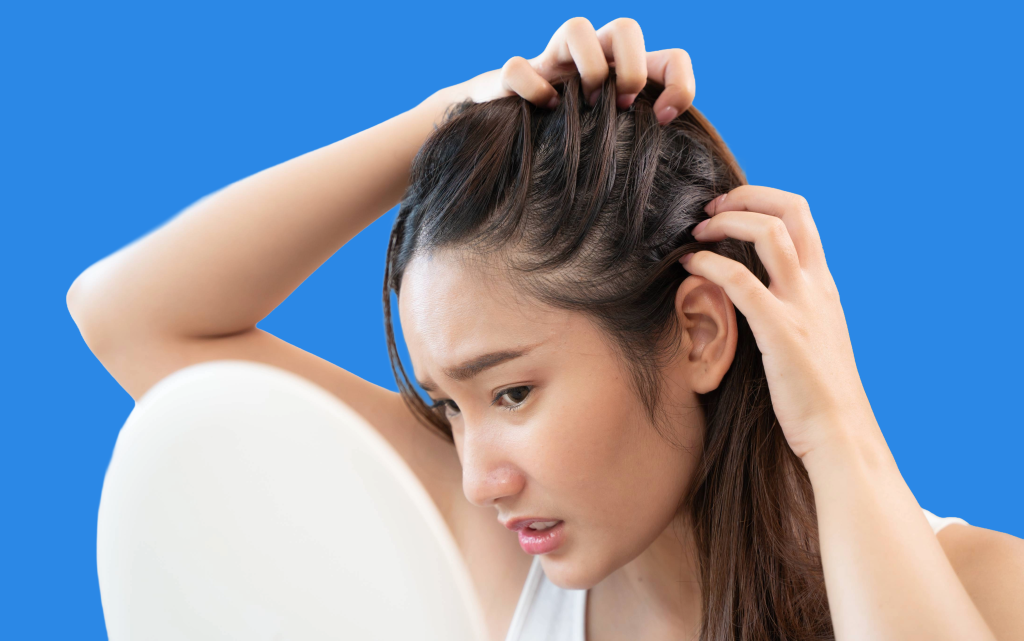

What You Need to Do
Select Your Concern & Book
Choose your health concern (like hair loss or weight) and answer a few quick questions. Pick a time that works for you.
Meet Your Provider
Chat or video call with a licensed provider who will assess your condition and prescribe treatment if needed.
Get Your Treatment
Get care for common conditions—and if medication is needed, prescriptions can be sent directly to your pharmacy or delivered to your door (where available).
Get Ongoing Support
Stay connected with follow-up care to track progress and adjust your treatment if necessary.
What Are Head Lice?
Head lice are tiny, parasitic insects that live on the human scalp and feed on blood. They lay sticky eggs (nits) close to the scalp that are hard to remove. Once hatched, the lice grow quickly and can reproduce daily, completing their life cycle in about 30 days.

How Do You Get Rid of Head Lice?
Treating head lice often requires a multi-step approach, including:
Prescription or over-the-counter medication
Manual removal using a fine-tooth lice comb
Alternative remedies, such as essential oils (note: not FDA-approved)
Professional treatments like heated-air devices
Because lice can be resistant or persistent, you may need to use more than one method to fully eliminate them and prevent reinfestation.
Is Pay-per-Virtual visit right for you?
-
You're 18 to 64 years old
-
Your child is between 2 and 11 years old
-
You've seen head lice or nits on yourself, your child, or someone in your household
Common Medications for Head Lice
Your iVisitDoc provider will assess your or your child’s symptoms and health history to determine if treatment is needed. If prescribed, you can pick up medication at a pharmacy of your choice. In many cases, the cost may be covered by your insurance.
Antiparasitics
Kill eggs and lice in one application
• Ivermectin 0.5% lotion (Sklice)
Permethrin and pyrethrins
Kill lice in two applications
• Permethrin 1% lotion (Nix)
• Pyrethrins + piperonyl butoxide shampoo (RID Lice Killing Shampoo)
Pro Tip
Start with lifestyle adjustments—like avoiding trigger foods, elevating your head while sleeping, and eating smaller meals. Medications work best when paired with healthy habits.
Quick virtual visits, anytime
Your questions answered
iVisitDoc Care & Access
What are my telehealth options for treating head lice?
iVisitDoc offers virtual visits with licensed providers who can evaluate your or your child’s condition and recommend medically appropriate treatments, including prescription options if needed.
Can I use my health insurance with iVisitDoc?
Yes. iVisitDoc accepts a variety of health insurance plans. For those without insurance, affordable self-pay options are also available.
What if my provider can’t confirm or treat the condition virtually?
If your provider determines that an in-person exam is needed, they’ll guide you to the next best steps, which may include visiting a local clinic or specialist.
Can I reach out to my provider after the visit?
Yes. You’ll have access to secure messaging to ask follow-up questions or clarify treatment instructions after your visit.
Is my health information secure with iVisitDoc?
Absolutely. We use HIPAA-compliant systems to ensure that your personal health information stays private and protected.
About Children Care
What head lice symptoms should I look for in my child, and how is it diagnosed through telehealth?
Learn how to spot the signs of lice at home (like itching and visible nits) and how an iVisitDoc provider can help confirm the diagnosis virtually.
What lice treatment options can iVisitDoc offer for children?
Our providers can recommend safe, age-appropriate treatments—including prescriptions if needed—and guide you through manual removal or over-the-counter options.
Who will treat my child, and do I need to be their legal guardian?
Licensed healthcare professionals will handle your child’s care. Yes, a parent or legal guardian must participate in the visit for children under 18.
How do lice spread, and how can I prevent reinfestation in my household?
Understand how lice are transmitted and get practical tips to stop it from spreading—like washing bedding, avoiding head-to-head contact, and checking family members.
When can my child return to school or daycare, and can I get a doctor's note?
Most children can return after treatment begins. Your provider can provide a doctor’s note if your school or daycare requires one.
About Children Care
Can I get treated for pubic lice through iVisitDoc?
Yes, iVisitDoc providers can evaluate and recommend treatment for pubic lice (crabs) if appropriate, based on your symptoms and health history.
Can my pets get or spread lice?
No. Lice are species-specific, meaning the lice that affect humans don’t live on pets, and vice versa.
What is the life cycle of lice?
Lice go through three stages:
Nits (eggs): Hatch in about 7–10 days
Nymphs: Immature lice that grow over a week
Adults: Can live up to 30 days on the scalp and lay up to 10 eggs per day
Where can I find medical sources about head lice?
All recommendations from iVisitDoc are informed by trusted clinical guidelines such as the CDC, American Academy of Pediatrics, and other evidence-based resources.
